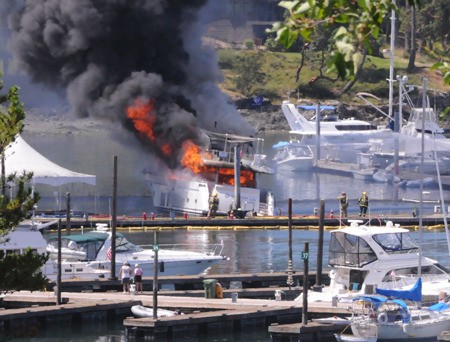The most costly fire ever on San Juan Island took place in what might be considered the smallest of spaces — 85 feet, to be precise.
That’s the length of a luxury yacht — bow to stern — that was gutted and almost completely destroyed July 10, after flames grabbed hold of a below-deck cabin at the front end of the vessel, which was moored at Roche Harbor Resort marina.
Advertised for sale by the Seattle office of Ocean Marine, a Taiwan-based manufacturer of Ocean Alexander megayachts and motoryachts, the value of the yacht was listed at $5.4 million, according to Chief Steve Marler of San Juan Island Fire Department. The loss, Marler noted, exceeds that of the fire that destroyed five businesses in downtown Friday Harbor on the afternoon of May 9, 2002, and that left a quarter-block of town smoldering in a heap of debris.
The loss from that fire — now the island’s second worst — totaled $2.5 million at the time.
“One could argue over values between then and now,” he said, “but this stands as the largest single-loss in dollar value on San Juan Island for as far as our records go back.”
Cleanup of fuel, oil and debris left in the wake of the fire also stands as a record-setter. Jackie Wolf of Islands Oil Spill Association said its crew collected 247 large bags of fuel-laden sorbent pads and oil-laden debris during a 28-hour shift at the fire scene. Capt. Deb Fritz of Towline Marine noted its crew and others at the scene filled another 60 bags with debris and pads saturated with oil and fuel over the next two days.
“It’s the biggest recovery we’ve ever done,” Wolf said, “by a long shot.”
Unoccupied when the fire broke out at about 10 a.m., the yacht was believed to have been carrying 1,600 gallons of diesel in its fuel tanks and another 60-80 gallons of hydraulic oil and motor oil in its engine compartment as well. The cause of the fire has yet to be determined. A U.S. Coast Guard detachment was deployed at the scene, as were state pollution prevention officials.
Marler said the location of the fire and its intensity, and the fact that the yacht had been tied-off to the dock at the rear, all contributed to the difficulty of battling the blaze. He said the department took an “extraordinary” step of sending fire fighters onto a burning boat in the early stages of combating the fire, but that they had to retreat and back out as the flames and intensity of the fire swelled.
“Anytime you’ve got a boat fire it’s going to be a real circuitous route to get to it,” he said. “By policy we don’t go aboard a burning boat, we don’t train for that, but it seemed reasonable given the risks versus potential rewards early on.”
Tapping into the saltwater at the marina, the Towline Marine crew initially battled the blaze, and joined Roche Harbor employees in moving nearby boats out of the fire zone. Resort employees strung an 800-foot spill-prevention boom around the slip where the yacht was moored as a precaution that proved pivotal in containing the fuel leak.
Firefighters arrived at the scene at about 10:15 a.m., followed by the Fire Boat Confidence about 45 minutes later. Still, the fire continued to rage.
Five hours later, at about 3:10 p.m., it finally fizzled out as the bow of the boat dropped below the waterline. What remained of the yacht sank at about 6 p.m.
Later that night, divers drained roughly 800 gallons of fuel from the wreckage. Another 400 gallons were pumped out of the yacht after a crane, which arrived on scene late Thursday, hoisted the hull — intact — out of the water.
The hull, along with the charred remains above, was towed Sunday from Roche Harbor to a boatyard in Bellingham.
While both the fire and the cleanup stand as unsurpassed, Marler is equally impressed by the sturdiness of the ship, and that its hull remained in one piece even after a five-hour fire gutted its interior.
“I’m sure it’s not the kind of publicity that the company would want,” he said. “but that boat just didn’t want to go down.”




